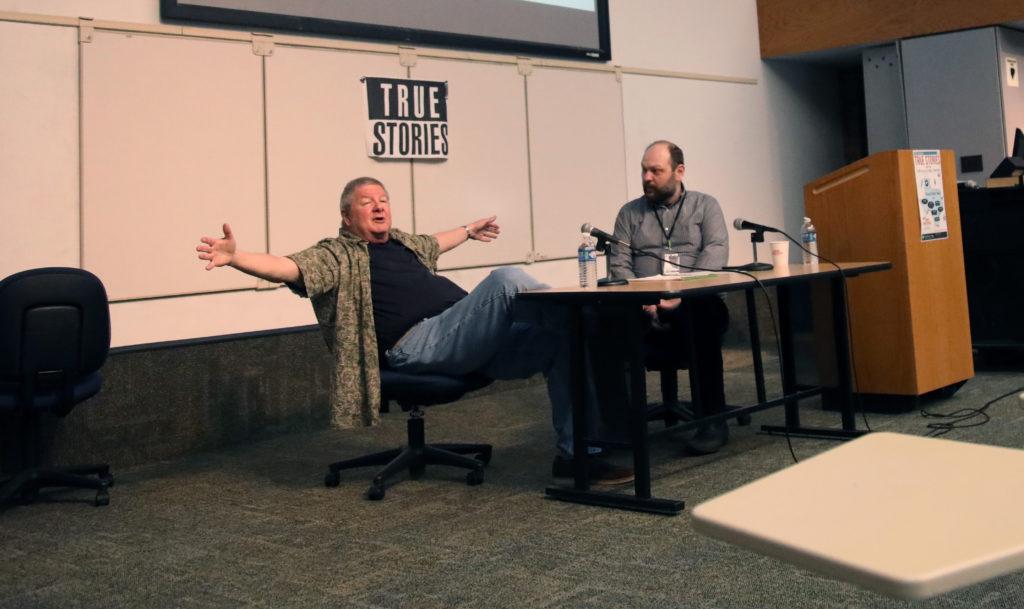
By Jubenal Aguilar
Editor-in-Chief
[email protected]
“More than ever, this world needs truth tellers,” former journalist Jeff Guinn said. Guinn, a New York Times bestselling author, spoke about his career as a journalist and non-fiction. He was part of the fifth annual True Stories event, at which journalists shared their experiences with students, staff and faculty April 26 in Room K234.
Guinn has authored 21 books, the first of which he published at age 40.
Guinn said he always wanted to be a writer. While growing up, he would read books from the Air Force bases where his father was stationed. By the time he graduated, Guinn had attended 24 schools.
His first great accomplishment, Guinn said, was to lead the student newspaper of John Jay High School in San Antonio. The newspaper, which is still published today, was the first bilingual student newspaper in Texas.
Guinn attended The University of Texas at Austin, where he majored in journalism. In 1969, the university did not have a track in place for authors. Guinn was one of 175 freshmen accepted into the university’s Plane II Honors Program. However, completion of the program would only qualify him to teach some college courses – it did not train him to be an author.
At age 29, Guinn became a freelance writer for the Fort Worth Star-Telegram. He wrote on every subject in which he could take an assignment, including business news, sports and arts. “It turned out I had a knack for getting people to talk to me,” Guinn said.
There is no better training to be a non-fiction writer than to be a journalist, he said.
“It is terribly hard work to be a good journalist,” Guinn said. “It is hard to write factual non-fiction. But at the same time, it is fun.”
At the Star-Telegram, Guinn learned from reporter Mike Cochran. “I learned my craft of being a journalist from one of the best, but I still wanted to write books.”
At age 40, Guinn published his first book. “Being an author is a humbling experience,” he said. It takes time, patience and commitment to do the research and write a book as opposed to writing for newspapers where hard deadlines have to be hit in short periods of time.
“American history is as much mythology as anything else,” Guinn said.
Guinn said he looks at an era of U.S. history he is interested in and focuses on an iconic individual or event to give the context on the subject. He used Bonnie and Clyde as his subjects when writing about being poor during the Dust Bowl. When he wrote about the mythology of the Western settling, he focused on the shootout at the O.K. Corral. Guinn has also written biographies on people including Charles Manson, Patricia Kremwinkle and Tim Carter, a survivor of the Jamestown mass suicide.
Guinn said it takes time to get to sources that no one else has talked to before.
“You can’t just expect you’re going to roll into a place and have four people who never talked before who have great stuff,” he said. “You’re going to have a lot of false alarms, but eventually there will be people.”
When he began his field research for “Manson: The Life and Times of Charles Manson,” Guinn spent three days in a diner in Manson’s hometown. After a couple visits, Guinn talked to a waitress who led him to a past girlfriend of Manson’s. She in turn led him to find a cousin and sister of Manson who had not talked to any press or media before.
His current work is writing the real history of the Mexican American border, Guinn said. “Have any of you ever seen a story in the newspaper or on TV that we tried to do this already?” he said. “It was a disaster.” Between 1910 and 1920, the country decided it needed to build a fence to keep Mexican immigrants out, Guinn said. But it did not work.
In his current research, Guinn has visited the southern border to see first-hand what is happening. He has spoken to border patrol agents about their work. He said the agents do not see a danger from the refugees attempting to cross the border, but from American citizens willing to shoot anyone who tries to cross. “This is why I write my books,” he said.
“That’s why we write what we write,” Guinn said. “At least we will get the facts out there.”






